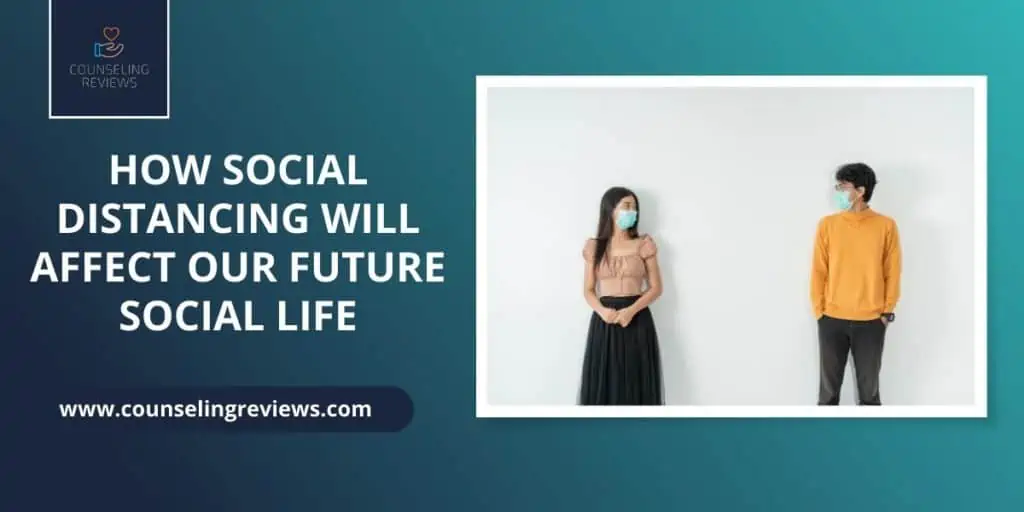With the COVID-19 pandemic upon us, maintaining a healthy mind is more important than ever. The practice of social distancing has been put in place to reduce the spread of COVID-19. While this is effective for your physical health and those in the higher-risk categories, it can negatively affect your mental health. Social distancing may inadvertently lead to feelings of loneliness and social isolation. Thankfully, there are ways that help ease these feelings so you can improve your health and well-being.

What is Social Distancing?
Social distancing is where we maintain a certain amount of physical distance from other people. To curb the transmission of COVID-19, people have been asked to stay six feet apart from anyone who is not part of their immediate social circle. No face-to-face or social contact. This has completely changed the way people live. In some areas, you are not allowed to visit with friends or family. Many businesses are shut down, people no longer go into work, and travel has basically been halted.
Social distancing is good for reducing transmission but bad for your mental health. The term social distancing itself can have negative associations. Social distancing can sometimes make you feel as though you have to completely cut yourself off from others. The term physical distancing may be a better way to look at the situation. In this case, you must remain physically distant from others but can be social, if you do so safely.
The Impact Social Distancing Has on Relationships
The impact of these national social distancing policies on relationships has been profound and multifaceted. For couples, whether married or dating, spending an extended period in close quarters due to lockdowns and restrictions has tested the strength of their bonds. While some have thrived under such measures, discovering new depths of intimacy and communication, others have faced challenges.
Dating has also undergone a significant transformation. The traditional dinner-and-a-movie date has been replaced by virtual meetups and socially distanced walks. These changes have prompted people to adapt and innovate in their romantic pursuits.
Moreover, long-distance relationships have faced heightened difficulties, with economic costs and travel restrictions making it challenging for partners to meet. Maintaining emotional connections has become a central concern, necessitating reliance on digital communication tools.
Overall, social distancing has forced couples and individuals to reevaluate their relationships, adapt to new norms, and find creative ways to nurture connections. It remains to be seen how these changes will shape the future of romantic and interpersonal relationships.
The Role Social Media Plays When Social Distancing?
Social media is an important way to connect with others. It is one way of practicing your social distancing strategies. Humans are social creatures who need to communicate with others regularly. During the pandemic, social media is being used to maintain social connections.
There are many tools available through social media to help you stay connected to your friends and family. For example, many video chat options enable you to not only hear but allow you to see the people you are missing. There are also many groups and conversations that you can join to express your feelings.
This type of connection is vital for everyone. Still, it is even more essential for those with existing mental health issues.
Social media has played a pivotal role during periods of social distancing, serving as a vital means of connection, community mobility, and information dissemination. Several key factors highlight its significance:
- Virtual Socialization: Social media platforms enable individuals to maintain social connections, chat, and engage with friends and family from a distance.
- Information Sharing: It serves as a primary source for updates on COVID-19, health guidelines, and government announcements.
- Business Continuity: Many businesses turned to social media for marketing, customer engagement, and sales during lockdowns.
- Mental Health Support: Online communities offer emotional support and resources for those struggling with isolation and anxiety.
- Entertainment: Social media provided entertainment, from live-streamed events to user-generated content, to alleviate lockdown-induced boredom.
The Benefits of Online Counseling
It is easy to say that you need to maintain social connections during the pandemic. It is much harder to actually do so. Social interactions directly affect a person’s mental health.
If you find yourself struggling with your own mental health, seeking professional health care online may be a great solution. Talk therapy, family counseling, and counseling for teens kids are all available online. While you may have some reservations about seeking therapy online, there are many benefits to this counseling style.
- Safe Space to Talk About Your Feelings: Social distancing creates a safe environment for individuals to openly discuss their emotions, anxieties, and concerns without fear of immediate physical judgment or exposure. It encourages honest conversations about mental health struggles.
- Accessible – Anyone with a Computer Can Take Part: Online mental health support makes help accessible to a wider audience. Geographical barriers are eliminated, and individuals from remote areas or with limited access to in-person therapy can connect with professionals easily.
- Affordable: Many online mental health platforms offer cost-effective solutions, making therapy more affordable and accessible to those who may have financial constraints. It allows individuals to prioritize their mental well-being without breaking the bank.
- Can Be Anonymous: Online mental health support offers the option of anonymity, which can be particularly valuable for those who prefer not to disclose their identity or who feel more comfortable discussing sensitive topics without revealing personal information.
- Sessions Can Be Completed at Any Time of Day: Online therapy provides flexibility in scheduling sessions. Individuals can choose appointment times that suit their daily routines, making it easier to incorporate mental health care into their lives without disrupting other commitments.
- Can Maintain Social Distance: Especially during times of infectious diseases or when social distancing measures is recommended, online mental health support allows individuals to receive help while adhering to safety guidelines. It ensures that mental health care remains accessible even during healthcare system crises.
How Not to Feel Lonely?
Loneliness has been a very real effect of social distancing and the COVID-19 pandemic. It is essential to protect people, but it is also important to protect your mental health. Should you find yourself feeling lonely, here are a few ways to help relieve the feeling of isolation.
Ways to alleviate the feeling of loneliness
- Go for a walk. You can see other people without having to get close to them
- Talk to your friends and family on social media
- Join a chat group and talk to people who are experiencing the same feelings as you
- Try online counseling
- Call your friends on the phone
- Remind yourself that you are not alone
Recovery and Adaptation after Social Distancing
As we gradually emerge from the era of social distancing, it becomes imperative to address the lasting effects it has left on individuals and society at large. Here are some key aspects of recovery and adaptation:
Strategies for Coping:
Individuals may find it challenging to readjust to a more social world after prolonged isolation. To cope, it’s crucial to prioritize self-care, both mentally and physically. Engaging in regular exercise, maintaining a healthy routine, and reconnecting with hobbies can help restore a sense of normalcy. Additionally, gradually reintroducing social interactions and setting realistic expectations for socializing can ease the transition.
Importance of Mental Health Support:
Many have faced heightened levels of anxiety, depression, and loneliness during the effectiveness of social distancing. Seeking professional mental health support is essential for those grappling with the long-term effects. Therapists and counselors can provide guidance and coping strategies to navigate emotional challenges and promote healing.
Societal Adaptation:
On a broader scale, society must adapt to promote social reconnection and community rebuilding. This includes creating spaces and opportunities for people to come together, fostering a sense of belonging, and supporting mental health initiatives. Building resilient communities and national healthcare systems that prioritize emotional well-being and encourage inclusivity will be instrumental in helping individuals recover from the isolation of social distancing.
Conclusion
Most people have taken the COVID-19 pandemic seriously. They are following the control measures set out by the government to limit the spread of the virus and flatten the curve. Unfortunately, many people are suffering from noticeable deterioration in their mental health. If this sounds like you, there are ways to cope with the problems. Try connecting with others on social media or enlisting the help of a mental health professional online.
You are not alone.





